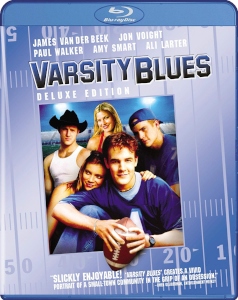I recall that the theater was packed with an enthusiastic crowd for “Varsity Blues” in January 1999. Not that it was a huge movie – all movies other than the summer blockbusters kind of snuck into theaters back then – but it was definitely a cool movie for young people.
It features “Dawson’s Creek’s” James Van Der Beek, other soon-to-be-stars like Paul Walker (R.I.P.), and a soundtrack lineup that’s the 1999 equivalent of the 1929 Yankees (tracks 2-6: Green Day, Foo Fighters, Collective Soul, Fastball, Third Eye Blind).
Transcending the cliches
Even at the time, I thought “Varsity Blues” was filled with clichés, but that it transcended the clichés. On my recent rewatch, I noticed that director Brian Robbins’ film is a mishmash of styles – and that this is certainly a strange choice — but it succeeds at all of the styles it tries.

“Varsity Blues” (1999)
Director: Brian Robbins
Writer: W. Peter Iliff
Stars: James Van Der Beek, Jon Voigt, Paul Walker
It’s somehow a parody of “Friday Night Lights” five years before that became a movie. (I’d give better than 50-50 odds that screenwriter W. Peter Iliff had read Buzz Bissinger’s “FNL” novel, but if he hadn’t, well, I suppose the stereotypes of Texas football culture were widely known anyway.)
I think it’s safe to say that “Varsity Blues” is more revered than the “FNL” movie (although if you throw in the excellent “FNL” TV show, comparing the legacies gets trickier).
Despite making fun of its own genre – a good example is the scene where Jon Moxon’s (Van Der Beek) dad (Thomas F. Duffy) demands that his son knock the beer can off the top of his head with a pass – “Varsity Blues” totally works as a straight chronicle of Texas prep football life too.
Career-ending injuries, cortisone injections, concussions, the backup QB being forced into action, coaches being treated like gods, and parents living vicariously through their kids – most of these themes are one-to-one borrows from “FNL.”
MTV version of an old story
This is a less nuanced, MTV-ified version of that old story, though, as Mox ultimately inspires his West Canaan Coyotes teammates to play for themselves and for the love of football as a pure sport.
The biggest leaps in logic happen in the final game, where the district title is on the line, but “Varsity Blues” has so won us over by this point that not only do we accept that Coach Bud Kilmer (Jon Voight at his squintiest and slimiest) retires at halftime – having lost his players’ loyalty – but we love it. Then we sit back and let the epicness of Foo Fighters’ “Hero” and the clutch blocked punt wash over us.
“Varsity Blues” is also a comedy, and it nails pretty much every joke it tries. It’s neck and neck with “Office Space” among the most quotable movies celebrating their 20th anniversary this year. Some lines are simple in the screenplay but embellished by actors getting into the spirit of it, like Billy Bob (Ron Lester, R.I.P.) yelling at “skinny-ass bitch” Mox to get in the truck for the ride to school.

Lesser high school comedies are a series of sketches that don’t fit together, but Iliff writes a tight screenplay, with all of the running threads getting a payoff. For example, sex-ed teacher Miss Davis (Tonie Perensky) turns out to be a stripper whom Billy Bob crushes on and asks to the prom in a killer scene-ending one-liner.
A simpler time
Tweeder/Tweeter (Scott Caan) admits to date-raping girls, and while he faces no legal repercussions – and is a key player in both the blocked punt and the most famous hook-and-lateral prior to Boise State-Oklahoma – he does notice a growth on his penis. So maybe he gets sick and dies from an STD a year later.
1999 was a simpler time than 2019 – for better and for worse — and “Varsity Blues” starkly illustrates this. The football action features hits more violent than anything allowed in the NFL today. Billy Bob plays with a concussion and Lance Harbor (Walker) plays with a cortisoned knee because Kilmer views them not as people but as assets for winning another district title.
Kilmer is a racist toward Wendell (Eliel Swinton), whom he uses as a workhorse but not on scoring plays. While the N-word doesn’t pop up in the film, the F-word slur toward gays does, in a throwaway comedic line where Billy Bob is praying for a win over Bingville.
Rallying behind Mox, the players force Kilmer out; today, they wouldn’t have to, because such a person wouldn’t be allowed anywhere near high school kids. It’s better today, sure, but at the same time, there is something to be said about having a system and a villain to rebel against. And it’s oh so satisfying when Mox does.

